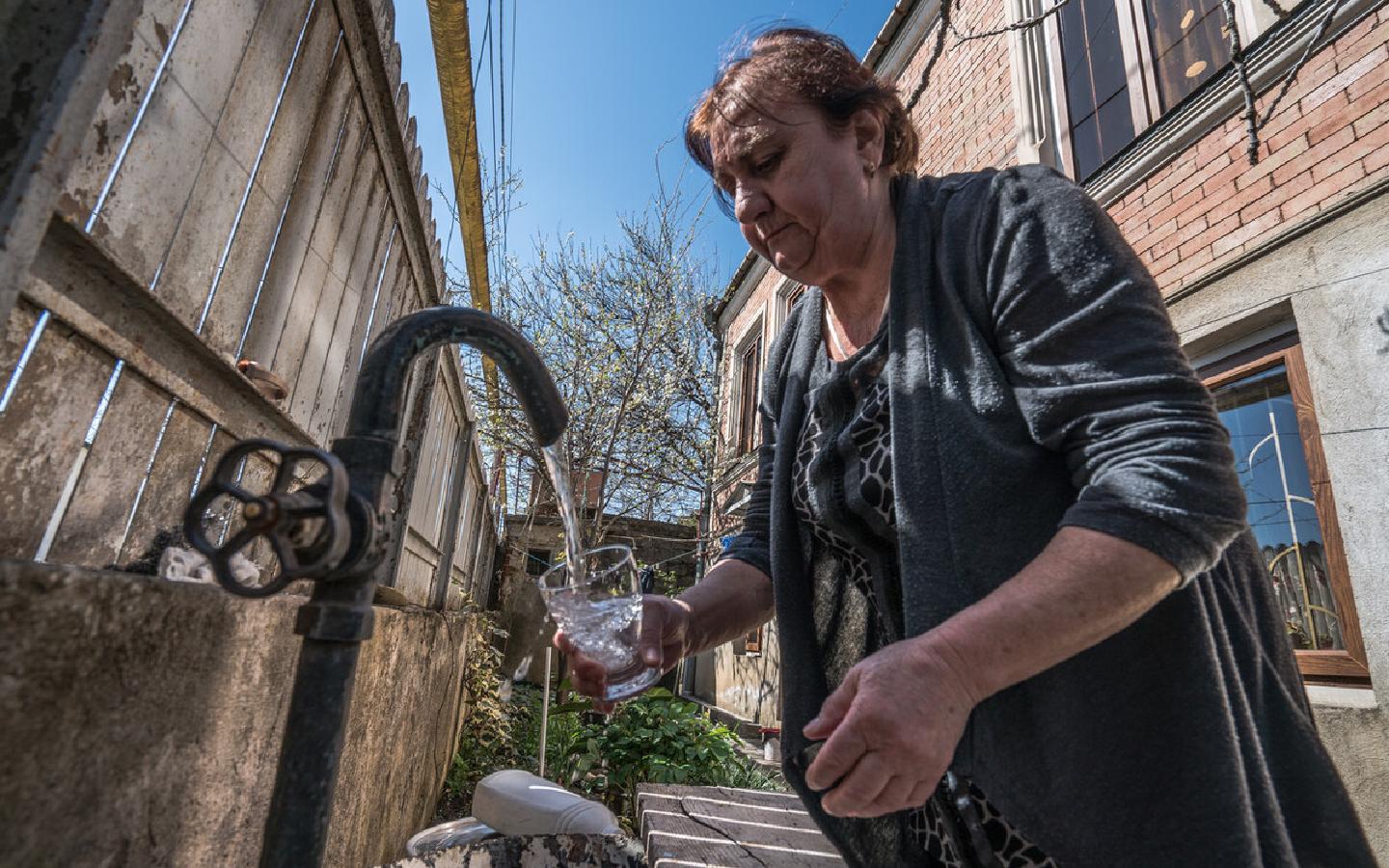Georgia’s water utility is getting a makeover and fostering a more gender-responsive work environment. ADB, France, and Japan are supporting water supply and sanitation sector reforms and promoting women’s participation and leadership in the sector.
United Water
Georgia embarked on major countrywide water supply and sanitation (WSS) sector reforms in 2010. Since then, the United Water Supply Company of Georgia (Georgia United Water) has been leading initiatives for change. The state-owned Georgia United Water was responsible for providing WSS services in secondary cities in 10 of the 11 regions of Georgia. Incorporated in 2010, it became the government’s arm in WSS reforms, drawing in about $800 million in infrastructure investments from 2011 to 2019. ADB has been collaborating with United Water since 2011 and is the biggest supporter of WSS infrastructure development in Georgia.
WSS reforms were prompted by disparities in access to WSS services, with the gap between urban and rural areas widening. Around 92% of people in cities have piped water, but only 64% of rural residents are connected. The water supply is unreliable, with daily availability ranging from 4 to 24 hours.
Like the urban–rural divide in water services, the gap between men and women workers in United Water is just as wide. Only 26% of its 3,500 employees are women. Women’s share in managerial positions is less than 20%, and only 1 of the 51 service centers is headed by a woman. Human resources policies and programs that address gender imbalance and persistent gender gaps, and promote women’s career advancement, are needed.
In 2020, Georgia Water became a prime candidate for reforms of state-owned enterprises to support post-pandemic economic recovery.
Reforms for Better Services
To enable Georgia United Water to execute a more efficient and inclusive approach to WSS, ADB approved in 2020 a $130 million policy-based loan and a $20 million project loan, together with a $250,000 technical assistance support, $225,000 of which will be provided as a grant by the High-Level Technology Fund, financed by the Government of Japan. The Agence Française de Développement provided a $31.8 million parallel loan.
The policy-based loan is supporting the government’s WSS policy for cities and rural communities. It will help build United Water’s capacity to better meet the demands of both urban and rural areas. As of April 2023, 24/7 water supply services were expanded in the city of Telavi Municipality, one of the largest rural centers in East Georgia. The project loan is helping enhance United Water’s governance, management, and operational capabilities. It works to increase household connections and improve metering, with the goal of achieving 100% metered connections. As of March 2024, over 70% of household connections are metered.
The High-Level Technology Fund technical assistance is introducing an asset management system (AMS) for water supply in select cities to be implemented by United Water. AMS technology offers an improved understanding of water networks that leads to extended asset lifespan, reduced water losses, and enhanced efficiency. It also supports better decision-making and effective maintenance planning.
The parallel loan from the Agence Française de Développement is financing improvements in United Water’s operational efficiency, equipment for operation and maintenance, and capacity-building activities. It is also implementing the use of SCADA or supervisory control and data acquisition system in the company’s operations.
“Georgia’s water sector is benefiting from transformative investment and reforms, promising improved quality of life through more efficient and reliable water services. As we closely monitor the unfolding impact of these reforms, the ongoing commitments are a testament to Georgia’s positive strides toward better infrastructure and the well-being of its communities,” said Maria Pia Ancora, senior urban development specialist at ADB.
Gender-Responsive Water Reforms
ADB’s support for United Water’s reforms includes specific requirements to enable women’s representation in managerial positions and improve water governance through women’s empowerment and critical engagement in everyday safe water use and management. The project’s gender action plan particularly emphasizes specific actions to provide underserved, poor, and vulnerable women with access to water and to ensure that women are included in decision-making processes regarding water supply issues.
“Women’s active participation in water sector reform in Georgia is critical for the sustainable and inclusive development of the sector,” said Tamar Bortsvadze, gender officer at ADB.
In 2021, United Water approved its Human Resources Management and Development Plan to address human resources–related issues and challenges in a gender-sensitive manner, and support the development, implementation, and improvement of its human resources management. Efforts focused on creating career advancement opportunities for women, enhancing women’s participation in management, technical roles, customer care, and financial management.
United Water also prioritizes equal pay and opportunity, endeavoring to create a discrimination-free environment to maximize employee skills, knowledge, and experience.
A major accomplishment of the gender reform agenda is the development of the Water Supply and Sanitation Vision and Policy Statement in 2021, which served as the basis for a water supply and sanitation (WSS) reforms framework for 2021–2030. The framework provides gender equality and social inclusion considerations in the implementation of WSS reforms through the involvement of the community and stakeholders by emphasizing the importance of women’s participation in the process.
“ADB support for reforms within Georgia United Water is helping improve the water supply and sanitation access and services to millions of Georgians. The decade-long partnership between ADB and Georgia United Water puts ADB in a distinct position to improve water access for women consumers as well as women’s equal representation for female employees within United Water itself,” said Heeyoung Hong, principal urban development specialist at ADB.
"Georgia's water sector is benefiting from transformative investment and reforms, promising improved quality of life through more efficient and reliable water services."
~ Maria Pia Ancora, ADB senior urban development specialist
Share"The decade-long partnership between ADB and Georgia United Water puts ADB in a distinct position to improve water access for women consumers as well as women’s equal representation for female employees within United Water itself."
~ Heeyoung Hong, principal urban development specialist
Share"Women’s active participation in water sector reform in Georgia is critical for the sustainable and inclusive development of the sector."
~ Tamar Bortsvadze, ADB gender officer
Share



